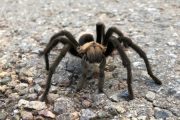On that January day in 1944, eight Hawker Typhoon fighter aircraft of 257 Squadron equipped with devastating rocket armament left Beaulieu in Sussex, flying due south across the English Channel for a raid on airfields near Paris on a route that took them dangerously close to the German anti-aircraft guns on the clifftops at Cap d’Antifer. Near Fecamp on the French coast, the Typhoon my dad was flying (JP 491) developed engine trouble, perhaps as a result of enemy fire, as did that of his fellow-pilot, Flying Officer ‘Jimmy’ James, in JP 799, and both had to land in neighbouring fields . F/O James was taken captive by Germans; my dad was luckier. He recalled feeling unaccountably light-hearted as he left the stranded Typhoon. He had survived; he was uninjured; he was young—not yet 23—and confident, and he was on an adventure. No-one in authority knew where he was. For the first time in his young life, he said, he felt free. He admitted that it slipped his mind at the time that his anxious fiancée would be wondering what had happened to him. Although it was cold, there was no snow. Country-born in East Anglia, historically an agricultural stronghold of ascetic Puritan stoicism, and bred to a life of class-based privation as the son of a warehouseman, and a proficient Boy Scout as well, he could read a rural landscape and was no stranger to hardship or sleeping rough: ever practical and resourceful, he had even worked as a volunteer for the Scouts among the poor of London’s East End after leaving school. As the incendiary device carried by the Typhoon that was to be used to prevent the aircraft from falling into enemy hands had failed to ignite, he left it and began walking away from it, crossing the field in which he had landed, eyes peeled for Germans.
After shedding his uniform, he spent a night in a barn, sleeping on piled hay, and soon thereafter fell down an unseen gully and had to repair the shoe that had split during the fall with a section of his own belt. Spotting a sentry on a nearby bridge across the Seine, he asked a Frenchman fishing for eels to row him across. The man did, albeit with a bad grace. Dad was fully aware that any French civilian knowingly assisting an enemy pilot could be shot by the Gestapo. He knew he would not get very far on his own without the aid of brave citizens who endured, and were to continue to endure, unceasing Gestapo raids and suspicion. He was led to the safe house of an Englishman by a young boy who, he said, seemed to be “not quite right in the head,” but it soon became apparent to him that this was “simply my failure to perceive that he had a speech impediment that my limited French had not allowed me to recognize.” These courageous people managed to send coded messages by telegram and word of mouth to one another, to Resistance fighters, and to his mother in England, and also fed him and gave him money, clothing and shelter for more than a week. Principal among them were a Mr. Taylor, an expatriate greengrocer from Brighton, and his wife, a French girl he had met when he was fighting Germans in the First World War twenty years before, and a M. Robert Fortier, who accompanied him on a train journey to Le Mans, and thence, via Chateauroux and Toulouse, to the Spanish border, where he hoped to cross the Pyrenees into neutral Spain, sail back to England to rejoin his squadron, and continue the struggle against Nazi tyranny.





Andrew Halpenny4 years ago
This is a wonderful, personal account of war. No remembered heroes, except to those they touched and loved. It is a very human story, and that is the essence of what we should remember of war.
Susan Leadlay2 years ago
I have just read this story, Peter, and found it very moving. It certainly paints a picture of the horrors of war, the inhumane treatment that some people can show to others, and, the complete opposite, too, the wonderful kindness and bravery of those who are prepared to help others, even in the face of the risk to themselves. I feel so strongly all that your father endured during his time of freedom, of imprisonment and during his long march. So awful.
How sad that you didn’t learn of the connection to your colleague at SRB, till it was too late. Such is life, though.